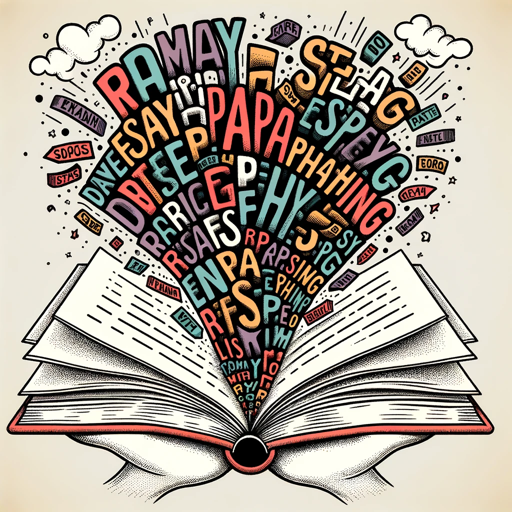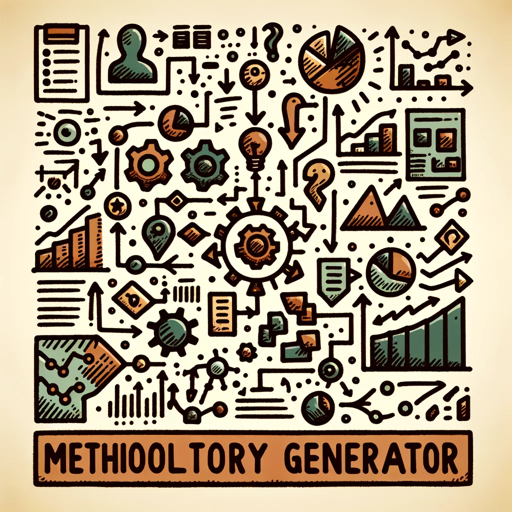Literature Recommender-book recommendations for all readers
AI-powered personalized book discovery
Recommend books on historical fiction.
Suggest journals on newest psychology research.
I'm interested in poetry. Any recommendations?
What are some good biographies to read?
Related Tools
Load More20.0 / 5 (200 votes)
Introduction to Literature Recommender
Literature Recommender is a specialized AI-driven tool designed to provide personalized literature recommendations based on a user's specific interests, needs, or inquiries. Its primary function is to curate diverse reading suggestions that span genres, themes, and authors, ensuring that each recommendation is well-suited to the user's request. The recommender uses a detailed understanding of literary themes, historical contexts, and the user's preferences to craft a tailored list of books. For example, if a user seeks novels about existentialism with feminist undertones, Literature Recommender can provide titles that marry these two concepts, such as 'The Bell Jar' by Sylvia Plath, while also offering more obscure titles to broaden the reader’s horizons. The system is designed to assist both casual readers and scholars alike, accommodating requests for broad genres or highly specific literary inquiries.

Core Functions of Literature Recommender
Personalized Book Recommendations
Example
A user asks for books that explore dystopian futures and human rights issues.
Scenario
In this case, Literature Recommender would provide suggestions such as 'The Handmaid’s Tale' by Margaret Atwood or '1984' by George Orwell, explaining the themes of surveillance, power, and individual freedom within these dystopian societies. The tool also might suggest lesser-known works like 'The Dispossessed' by Ursula K. Le Guin, expanding the user's reading beyond the typical canon.
Multi-Genre Exploration
Example
A user requests literature that blends historical fiction with magical realism.
Scenario
Literature Recommender could recommend 'One Hundred Years of Solitude' by Gabriel García Márquez for its use of magical realism to explore Latin American history, or 'The Night Circus' by Erin Morgenstern for its historical fantasy elements. This function is particularly helpful for readers looking to explore intersections between multiple genres.
Thematic and Scholarly Research Assistance
Example
A student researching postcolonial literature seeks academic texts and novels for a thesis.
Scenario
In this academic context, Literature Recommender would suggest key texts such as 'Things Fall Apart' by Chinua Achebe and 'Wide Sargasso Sea' by Jean Rhys, alongside critical essays and scholarly works that explore postcolonial theory. The tool helps researchers locate important literary works that align with their academic focus.
Ideal Users of Literature Recommender
Casual Readers
These are individuals who enjoy reading as a hobby and are looking for book recommendations based on genres, themes, or authors they enjoy. They might seek suggestions for vacation reading, or a new series to dive into. The Literature Recommender offers them curated, diverse book lists that match their personal preferences while also introducing new authors and ideas.
Students and Scholars
Students working on literary essays or researchers in need of thematic or genre-specific texts benefit from Literature Recommender. Whether working on a specific theme like the Harlem Renaissance or needing sources for an exploration of literary modernism, this tool provides relevant academic and literary sources, saving time in research and discovery.

Guidelines for Using Literature Recommender
Step 1
Visit aichatonline.org for a free trial without login, also no need for ChatGPT Plus. This offers you immediate access to all functionalities of the Literature Recommender.
Step 2
Define your specific literary needs: whether you’re seeking recommendations for a specific genre, academic research, or exploring new authors. This will help you get more tailored responses.
Step 3
Provide key details such as the topic, themes, or authors you are interested in. The more precise your request, the better the recommendations will align with your preferences.
Step 4
Review the provided recommendations, which will include a variety of genres, summaries, and detailed insights. Consider comparing books based on the abstracts to determine which matches your needs best.
Step 5
Use the recommendations for your desired purpose: academic research, personal reading, or creative writing inspiration. Keep notes on which styles or genres work best for your needs.
Try other advanced and practical GPTs
Video to Text
AI-powered video transcription made easy

URL2Blog
Transform any URL into a compelling blog using AI.

A股情绪周期交易模型
AI-powered market sentiment tracking.

Beautify Me
AI-powered photo enhancements made easy.

Security GPT
AI-driven cybersecurity guidance

VIN Decoder
AI-powered vehicle identification decoding.

Essay Paraphraser
AI-driven text rephrasing made simple.

Web Search
AI-Powered Web Search for In-Depth Information

Methodology Generator
AI-powered research methodology advice

Brainstorm Generator
AI-Powered Ideas for Your Projects

Advisory Board v. 1.1
Your Virtual Council of Experts

Red bubble SEO Generator
AI-powered SEO for Redbubble designs
- Creative Writing
- Academic Research
- Genre Exploration
- Casual Reading
- Book Clubs
Common Questions About Literature Recommender
What types of literature can Literature Recommender help me find?
Literature Recommender can assist with a wide range of genres including fiction, non-fiction, academic research papers, poetry, and even niche sub-genres like dystopian fiction or historical memoirs. It is versatile in providing suggestions tailored to specific topics or themes.
How personalized are the book recommendations?
Recommendations are highly personalized based on the information you provide. The more detail you offer about the themes, genres, or authors you're interested in, the more precise the recommendations become, ensuring they match your unique preferences.
Can Literature Recommender suggest academic resources for research?
Yes, it’s perfect for academic needs. Whether you're researching a specific topic or looking for foundational texts in a given field, it offers recommendations spanning academic books, papers, and related scholarly works.
How diverse are the recommendations provided?
The tool is designed to include diverse voices and genres, ensuring representation across cultures, genders, and regions. It offers recommendations that balance both popular and lesser-known works from a global range of authors.
How do I optimize my use of Literature Recommender?
To get the most out of it, clearly state your desired genre, theme, or even specific authors. Including your reading purpose (e.g., casual, academic) helps refine the suggestions. Experiment with different combinations of preferences to explore new kinds of literature.